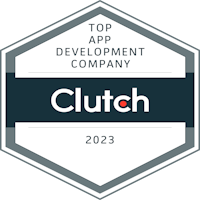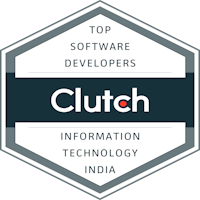With its ability to analyze vast amounts of data at unprecedented speeds, AI is empowering the healthcare industry in ways that were once thought impossible. From enhancing diagnostic accuracy and planning to streamlining administrative processes, AI is revolutionizing the way healthcare professionals operate.
Statista reports that the global value of AI in healthcare reached approximately $11 billion in 2021, with projections anticipating a remarkable ascent to $188 billion by 2030. This surge reflects a compounded annual growth rate (CAGR) of 37% from 2022 to 2030, underscoring the escalating significance and rapid integration of artificial intelligence within the healthcare industry.
As we delve into the intersection of technology and healthcare, this exploration unveils the myriad ways in which AI is not just a tool but a catalyst for unprecedented advancements, ultimately paving the way for a more effective, accessible, and patient-centric healthcare system.
Assisting in Clinical Decision Making
Through the provision of data, AI aids healthcare professionals in diagnosing, treatment planning, and health management, fundamentally altering the approach to clinical decisions.
This transformative technology extends its support to data-intensive medical specialties such as ophthalmology, radiology, and pathology, with the potential to enable autonomous task performance in the near future.
With a dedication to accuracy and speed, the AI development company streamlines data entry for physicians by using natural language processing to enable the translation of clinical notes within Electronic Health Records (EHRs).
Optimize the Precision of Diagnosis
By deploying AI-powered algorithms, this innovative company contributes to the analysis of medical images, pathology slides, and genetic data, providing invaluable support to healthcare professionals in the precise detection of diseases.
Noteworthy achievements include the exceptional accuracy demonstrated by AI-based systems in diagnosing conditions such as cancer, cardiovascular diseases, and neurological disorders. Through its collaborative efforts, the app development company not only elevates patient outcomes but also holds the potential to save lives by minimizing diagnostic errors and facilitating early intervention.
Giving Surgical Robotic Expertise
Engaging in robot-assisted surgery represents a prominent and widely embraced application of AI in healthcare. The synergy between AI and collaborative robots has transformed surgical procedures, mitigating risks associated with blood loss, pain, and other side effects. The incorporation of AI enhances surgical precision, allowing surgeons to navigate through intricate procedures with heightened accuracy.
This not only contributes to a reduction in post-surgery complications but also facilitates a quicker and smoother recovery for patients. A compelling example is the utilization of AI-powered robots at Maastricht University Medical Center, where surgeons adeptly suture small blood vessels, some as delicate as 0.03 millimeters.
Through the integration of AI in medicine and healthcare, surgeons gain access to real-time information, empowering them to make informed decisions throughout every stage of a procedure. This AI-driven data ensures healthcare providers can act promptly and intelligently, ultimately optimizing outcomes for patients.
Revolutionizing personalized patient care
AI technology facilitates the creation of intelligent healthcare systems capable of real-time patient monitoring and tailored interventions. Equipped with AI algorithms, wearable devices, and sensors diligently track vital signs, activity levels, sleep patterns, and other health-related metrics.
This continuous monitoring empowers AI systems to promptly alert healthcare providers to deviations from normal ranges, fostering timely interventions and proactive healthcare management.
In addition, AI-driven chatbots and virtual assistants redefine patient interactions with healthcare providers. These sophisticated tools address basic medical inquiries, offer self-care guidance, and triage patients according to their symptoms. Instantaneously providing access to healthcare information and support, AI chatbots elevate patient engagement, enhance healthcare accessibility, and alleviate the workload on healthcare providers.
This transformative integration of AI not only personalizes patient care but also contributes to a more efficient and patient-centric healthcare experience.
Fraud Detection
Addressing the pervasive issue of healthcare fraud, the US Justice Department highlights that 3% of healthcare claims in the nation are fraudulent, resulting in an annual loss of $100 billion. The incorporation of AI in healthcare proves instrumental in combating this challenge by swiftly identifying invalid claims and expediting the processing, approval, and payment of legitimate ones. Beyond its role in insurance fraud detection, AI safeguards patient data from theft.
Prominent healthcare service providers, including Harvard Pilgrim Health, are at the forefront of leveraging AI to combat healthcare fraud. Employing AI-based fraud detection systems, these entities effectively identify suspicious claims and behaviors, demonstrating the proactive role of AI in preserving the integrity of healthcare systems.
Drug Production
Revolutionizing the traditional timelines and costs associated with pharmaceutical development, the introduction of AI in drug creation accelerates the process while significantly reducing expenses. One notable example is the application of AI by Atomwise, a network utilizing supercomputers to extract therapeutic insights from molecular structure databases.
In a groundbreaking instance in 2015, Atomwise employed its AI technology to swiftly identify existing medicines in the market that could be repurposed for treating the Ebola virus. This innovative approach yielded the discovery of two potential drugs within a single day, a feat that would have traditionally taken years through conventional methods.
Atomwise’s AI technology emerges as a transformative force, streamlining drug discovery processes and offering unprecedented efficiency in the quest for effective treatments.
Helping with Repeated Tasks
There is a notable shift towards the realm of Cognitive Assistants endowed with reasoning abilities, analytical prowess, and an extensive repository of medical knowledge. A recent introduction to this paradigm is the algorithm Medical Sieve, acknowledged for its proficiency in supporting decisions within cardiology and radiology.
This cognitive health assistant specializes in analyzing radiology images, demonstrating an enhanced capability to swiftly and reliably detect issues in comparison to conventional methods. The integration of such advanced algorithms marks a significant stride in leveraging technology to streamline and enhance diagnostic processes in the medical field.
Conclusion:
In conclusion, the transformative impact of AI on the healthcare industry is unmistakable, ushering in an era of unprecedented efficiency, precision, and personalized care. From diagnosing and treating diseases with enhanced accuracy to revolutionizing surgical procedures and facilitating real-time patient monitoring, AI has become an indispensable ally for healthcare professionals.
As the industry continues to embrace this technological revolution, collaboration with proficient app development companies becomes paramount. The synergy between AI and skilled app developers holds the key to unlocking innovative solutions that can further optimize patient care, streamline administrative processes, and advance medical research.
In this dynamic landscape, the imperative to hire app developers with expertise in AI integration becomes essential, ensuring that the healthcare industry continues to evolve, adapt, and provide cutting-edge solutions that ultimately benefit patients and healthcare providers alike.











